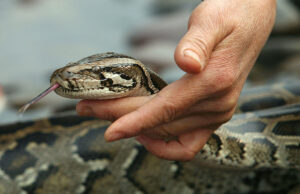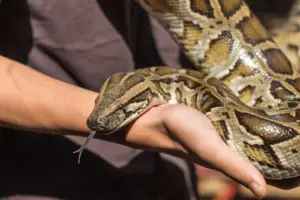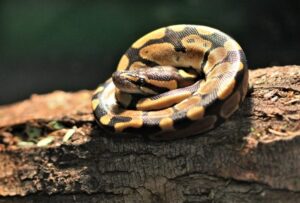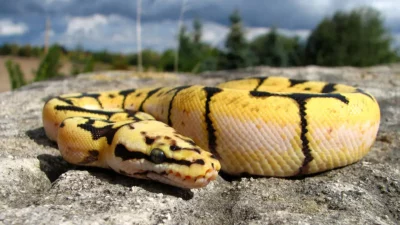For many intrigued by the enigmatic allure of ball pythons, a pressing question often lingers on the edge of curiosity: Do ball pythons bite? As we delve into the captivating world of these mesmerizing serpents, it’s essential to demystify the common misconceptions surrounding their temperament and behavior.
On this page, we will explore the fascinating nature of ball pythons, understanding the factors that may influence their tendency to bite, and ultimately uncovering the truth behind the question that has piqued the interest of reptile enthusiasts and aspiring snake owners alike.
Understanding Ball Python Behavior

Understanding the behavior of ball pythons (Python regius) is crucial for providing them with proper care and ensuring their well-being. Ball pythons are known for their docile nature, but like any animal, they have specific behaviors and needs.
Here are some key aspects of ball python behavior:
- Ball Curling:
- Defensive Posture: When a ball python feels threatened or stressed, it may assume a defensive posture known as “balling up.” This involves coiling into a tight ball, with the head tucked in the center, and hiding it with their body. This behavior is a natural defense mechanism.
- Hiding:
- Nocturnal Habits: Ball pythons are primarily nocturnal, meaning they are more active during the night. In the wild, they spend their days hiding in burrows or other sheltered spots, coming out to hunt at night. Provide hiding spots in their enclosure to mimic this natural behavior.
- Exploration:
- Curious Nature: Ball pythons can be curious animals, and they may explore their environment. This behavior is normal as long as the snake doesn’t seem stressed or anxious.
- Eating Behavior:
- Ambush Predators: In the wild, ball pythons are ambush predators. They patiently wait for prey to come within striking distance before striking. Captive ball pythons may exhibit this behavior during feeding, where they wait for the prey to come close before striking.
- Thermoregulation:
- Basking and Cooling: Ball pythons regulate their body temperature by moving between warmer and cooler areas in their environment. Provide a temperature gradient in the enclosure with a warm side and a cooler side to allow them to thermoregulate.
- Handling:
- Tolerance to Handling: Ball pythons are generally known for their tolerance to handling, but individual snakes may have different preferences. Some may enjoy being handled, while others may be more reserved. Always handle them gently and be attentive to their body language.
- Shedding:
- Opaque Eyes: Before shedding, a ball python’s eyes may turn a milky or opaque color. During this time, they may become more reclusive and less interested in food. Provide a humidity boost to help facilitate a smooth shed.
- Reproduction:
- Breeding Behaviors: During the breeding season, male ball pythons may exhibit specific behaviors, such as searching for a mate, engaging in courtship rituals, and copulation.
- Health Signs:
- Active and Alert: A healthy ball python is generally active and alert. Changes in behavior, appetite, or appearance may be indicative of health issues.
It’s important to observe your ball python regularly, providing a suitable environment, and adjusting care based on their individual needs. If you notice any significant changes in behavior or health, consult with a veterinarian experienced in reptile care.
Do Ball Pythons Bite?
Yes, ball pythons can bite, but they are generally known for their docile nature. Ball pythons are often recommended as good pets for reptile enthusiasts, including beginners, because they are typically more tolerant of handling than some other snake species.
However, like any animal, individual temperament can vary, and there are situations that might lead a ball python to bite. Here are some common reasons why a ball python might bite:
- Stress or Fear:
-
- If a ball python feels threatened or stressed, it may bite as a defensive reaction. This can happen if they are handled too roughly, approached too quickly, or feel insecure in their environment.
- Hunger:
-
- Sometimes, if a snake mistakes a hand for food or is hungry, it might strike. It’s essential to wash your hands thoroughly before handling your snake to remove any food scents.
- Health Issues:
-
- A snake in pain or discomfort due to health issues may become more defensive and prone to biting. Regular veterinary check-ups and prompt attention to any signs of illness are crucial.
- Agitation during Shedding:
-
- Snakes can be more irritable and defensive during the shedding process. Their eyes become opaque, and their vision is impaired, making them more prone to stress.
- Protecting Eggs:
-
- Female ball pythons, especially during the breeding season, may become protective of their eggs. If disturbed, they might bite to defend their nest.
- Individual Personality:
-
- Just like people, individual snakes have different personalities. While ball pythons are generally known for their calm demeanor, there can be variations in temperament from one snake to another.
To minimize the risk of being bitten, it’s essential to handle your ball python gently and to be attuned to its behavior. Give your snake time to acclimate to its environment and to your presence. If you’re unsure about your snake’s behavior or if it seems stressed, it’s best to avoid handling it until it appears more comfortable.
If a bite does occur, remain calm. Wash the wound thoroughly with soap and water, as snake bites can carry bacteria. Seek medical attention if the bite becomes infected or if you experience an adverse reaction. Always consult with a veterinarian if you have concerns about your ball python’s health or behavior.
Preventing ball pythons Bites

Preventing ball python bites involves understanding their behavior, respecting their space, and practicing safe handling techniques.
Here are some tips to help minimize the risk of bites and ensure a positive interaction with your ball python:
- Give Them Time to Acclimate:
-
- When you bring a new ball python home, allow it some time to acclimate to its new environment before attempting to handle it. Give the snake time to explore and settle in.
- Handle with Care:
-
- Always handle your ball python gently and confidently. Avoid sudden movements, and approach the snake calmly. Ball pythons can be more sensitive to fast or erratic movements, which may stress them.
- Wash Your Hands:
-
- Wash your hands thoroughly before handling your ball python to remove any scents, especially those associated with food. This can help prevent accidental bites that may occur if the snake mistakes your hand for prey.
- Read Body Language:
-
- Pay attention to your snake’s body language. If it seems agitated, stressed, or is exhibiting defensive postures (such as balling up), it may be best to avoid handling at that time.
- Avoid Handling During Shedding:
-
- Snakes may be more irritable and defensive during the shedding process. It’s generally recommended to avoid handling your ball python during this time to reduce stress.
- Use Proper Handling Techniques:
-
- Support your snake’s body properly when handling to make it feel secure. Avoid grabbing or restraining the head excessively, as this can make the snake feel threatened.
- Handle Regularly:
-
- Regular, gentle handling from an early age can help your ball python become accustomed to human interaction. However, respect the snake’s preferences, and if it shows signs of stress, give it a break.
- Create a Safe Environment:
-
- Provide a secure and comfortable environment for your ball python. Ensure that the enclosure has proper hiding spots, appropriate temperature gradients, and a consistent feeding schedule.
- Avoid Disturbing While Eating:
-
- Do not handle your ball python immediately before or after feeding. Snakes can be more defensive or prone to biting during these times.
- Know Your Snake:
-
- Pay attention to your individual snake’s temperament. Each snake has its own personality, and some may be more prone to stress or defensive behavior than others.
If you do get bitten, stay calm and gently remove the snake from your hand. Wash the bite area thoroughly with soap and water. Seek medical attention if there are signs of infection or if you have concerns about the bite.
Remember that patience and understanding are key when dealing with any pet, and positive interactions will help build trust between you and your ball python over time.
What to Do if Bitten by ball pythons
If you are bitten by a ball python, it’s essential to remain calm and take appropriate steps to ensure both your safety and the well-being of the snake.
Here’s a step-by-step guide on what to do if bitten by a ball python:
- Stay Calm:
-
- It’s natural to feel alarmed if bitten, but staying calm is crucial. Most ball python bites are not venomous and are generally harmless. Panicking may escalate the situation.
- Gently Remove the Snake:
-
- Slowly and gently encourage the snake to release its bite. Do not jerk or pull the snake off forcefully, as this may cause more harm.
- Wash the Bite Area:
-
- Wash the bite area thoroughly with soap and water. This helps reduce the risk of infection. Avoid using harsh chemicals or disinfectants, as they may irritate the wound.
- Control Bleeding:
-
- Ball python bites are usually not severe, but if there is bleeding, apply gentle pressure with a clean cloth or bandage to control it. Elevate the bitten area if possible.
- Monitor for Signs of Infection:
-
- Keep an eye on the bite site for any signs of infection, such as redness, swelling, or discharge. If you notice these signs, seek medical attention promptly.
- Seek Medical Attention if Necessary:
-
- While ball python bites are typically not dangerous, some individuals may experience an allergic reaction or secondary infection. If you develop severe pain, swelling, difficulty breathing, or any other concerning symptoms, seek medical help immediately.
- Identify the Cause:
-
- Reflect on the circumstances leading to the bite. Was there a specific trigger or stressor? Understanding the cause can help you avoid similar situations in the future.
- Evaluate Your Handling Techniques:
-
- Consider whether there were any mistakes in your handling techniques that may have contributed to the bite. Adjust your approach accordingly to minimize the risk of future incidents.
- Give the Snake Space:
-
- After a bite, it’s essential to give the snake some time to calm down. Stress can be a factor in defensive behavior. Avoid handling the snake immediately after a biting incident.
- Consult a Veterinarian:
-
- If the snake is behaving unusually or showing signs of illness or distress, consult a veterinarian experienced in reptile care for guidance.
Remember that ball pythons are non-venomous, and their bites are not typically harmful. However, any wound carries the risk of infection, so it’s crucial to take proper care of the bite site and seek medical attention if needed. Additionally, reflecting on the incident and adjusting your handling techniques can help prevent future bites.
Tips for Safe Handling ball pythons

Safe handling is crucial when interacting with ball pythons or any other pet snake. Here are some tips to ensure the safe handling of ball pythons:
- Wash Your Hands:
-
- Always wash your hands before handling your ball python. This helps remove scents, especially those associated with food, which could otherwise trigger defensive behavior.
- Handle with Confidence:
-
- Approach your snake calmly and handle it with confidence. Snakes can sense fear or uncertainty, and confident handling helps them feel more secure.
- Avoid Sudden Movements:
-
- Sudden movements can startle a snake and may lead to stress or defensive behavior. Move slowly and predictably when interacting with your ball python.
- Support the Body:
-
- When picking up a snake, support its body properly to make it feel secure. Avoid grabbing the snake’s head excessively, as this may cause stress and make the snake more likely to bite.
- Use a Snake Hook (Optional):
-
- If you’re unsure about your snake’s mood or if it’s a larger individual, you can use a snake hook to gently lift the snake. This provides an additional level of control and can help avoid accidental bites.
- Avoid Disturbing While Eating:
-
- Do not handle your ball python immediately before or after feeding. Snakes can be more defensive during these times, and handling may result in a defensive strike.
- Know Your Snake’s Limits:
-
- Pay attention to your snake’s behavior. If it shows signs of stress, such as defensive postures or hissing, it’s best to put it back in its enclosure and try handling at a later time.
- Handle in a Controlled Environment:
-
- Choose a quiet and controlled environment for handling. Avoid noisy or high-traffic areas, as this can stress the snake.
- Avoid Handling During Shedding:
-
- Snakes can be more irritable during shedding. It’s generally recommended to avoid handling your ball python during this time to minimize stress.
- Educate Yourself:
-
- Learn about ball python behavior and body language. Understanding their natural instincts and signs of stress can help you interpret your snake’s behavior during handling.
- Be Mindful of Temperature:
-
- Ensure that the room and the snake’s environment are at the appropriate temperature. Snakes are ectothermic and rely on external sources to regulate their body temperature.
- Have a Plan for Enclosure Escape:
-
- Always handle your snake over a secure surface, and have a plan in case it tries to explore outside the enclosure. Be prepared to gently guide it back if needed.
- Avoid Handling During Breeding Season:
-
- Male ball pythons can be more aggressive during the breeding season. If you have a male, be cautious during this time and consider avoiding handling unless necessary.
By following these tips, you can help ensure a positive and safe handling experience for both you and your ball python. Regular, gentle handling can contribute to building trust between you and your pet.
You should always remember that each snake is an individual, and their comfort levels may vary, so be attentive to their behavior and adjust your approach accordingly.
Common Misconceptions about Ball Python Bites
Several misconceptions surround ball python bites, and it’s essential to dispel these myths to provide accurate information and foster a better understanding of these reptiles. Here are some common misconceptions about ball python bites:
- Ball Pythons are Venomous:
-
- Fact: Ball pythons are not venomous. They are constrictors, meaning they subdue their prey by squeezing rather than injecting venom. Their bites are not harmful in terms of venom, but they can cause puncture wounds and may lead to infection if not properly cared for.
- Ball Pythons are Aggressive:
-
- Fact: Ball pythons are generally known for their docile nature. While they may bite if they feel threatened or stressed, aggression is not a typical behavior. Most bites occur as a defensive response, not as an aggressive attack.
- All Bites Result in Serious Injury:
-
- Fact: The majority of ball python bites are not severe. While the bites can be painful and may cause bleeding, they are not life-threatening. Bites are usually a defensive response and are not intended to cause harm.
- Bites are Always Unprovoked:
-
- Fact: Ball pythons typically bite in response to stress, fear, or feeling threatened. Bites are often provoked by specific actions, such as sudden or rough handling, and can be minimized by handling the snake with care and respect.
- All Ball Pythons Have the Same Temperament:
-
- Fact: Each ball python has its own personality and temperament. While the species is generally known for being docile, individual snakes may vary in their tolerance for handling. It’s essential to be attentive to the specific behaviors of each snake.
- A Bite Means the Snake is Always Aggressive:
-
- Fact: A single bite does not necessarily indicate a permanently aggressive snake. It might be a response to a specific situation or stressor. With proper care, positive interactions, and understanding, many ball pythons can become more tolerant of handling over time.
- Bites Always Result in Infection:
-
- Fact: While snake mouths can carry bacteria, not every bite leads to infection. Proper wound care, including cleaning the bite site thoroughly with soap and water, can significantly reduce the risk of infection.
- Handling Will Always Lead to Bites:
-
- Fact: While bites can occur, regular and gentle handling from an early age can help acclimate ball pythons to human interaction. Understanding the snake’s behavior and respecting its preferences can minimize the likelihood of bites.
- Bites Always Happen During Feeding:
-
- Fact: While bites can occur during feeding if a snake mistakes a hand for food, they can also happen at other times due to stress or defensive behavior. It’s crucial to be cautious and handle the snake appropriately.
- All Bites Are the Same:
-
- Fact: Bites can vary in intensity. Some may be quick warning strikes, while others may involve holding onto the hand for a longer period. Understanding the circumstances leading to the bite can help prevent similar incidents in the future.
By dispelling these misconceptions, individuals can better understand ball python behavior, reduce unnecessary fear, and promote responsible ownership. Proper handling, respect for the snake’s needs, and education about these animals contribute to a positive relationship between humans and ball pythons.
Conclusion
This page answers the question on do ball pythons bite. While ball pythons have the potential to bite, understanding their natural behavior, addressing environmental factors, and practicing responsible handling can significantly minimize the likelihood of bites.
By creating a suitable habitat, respecting the snake’s boundaries, and being attentive to signs of stress, owners can foster a positive relationship with their ball pythons and reduce the risk of bites.
Education and dispelling misconceptions are crucial in promoting responsible ownership and ensuring the well-being of these fascinating reptiles.

